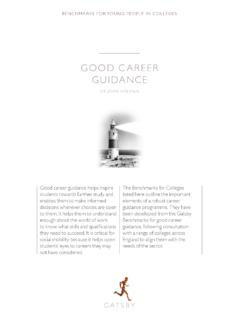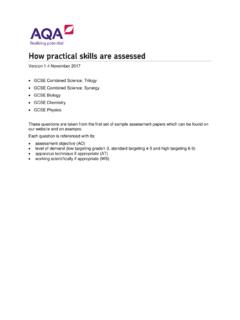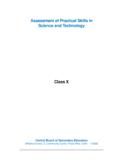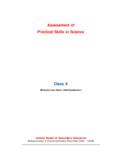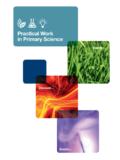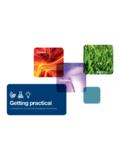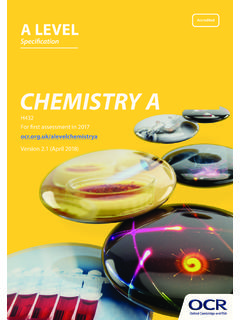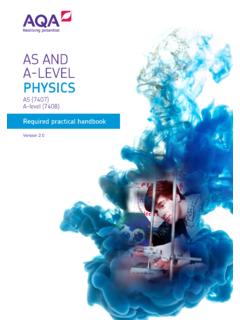Transcription of GOOD PRACTICAL SCIENCE - Gatsby
1 good PRACTICAL SCIENCEJOHN HOLMANWHY PRACTICAL SCIENCE ?Experimentation gives SCIENCE its identity. SCIENCE uses experiments to discover the realities of the world, and this PRACTICAL approach is as intrinsic to young learners as it is to professional researchers. PRACTICAL SCIENCE is important for learning, not only because doing experiments is a good way to learn scientific ideas and theories. The UK needs more scientists, engineers and technicians if our knowledge economy is to flourish, and PRACTICAL SCIENCE shows students at first hand how scientists and technicians work. It engages students to follow SCIENCE fur ther, on academic or technical routes. It gives them PRACTICAL skills and attitudes that will be valuable in their future careers. Our study has shown that many of the ingredients of good PRACTICAL SCIENCE are the ingredients of all good SCIENCE learning expert teachers, well-planned lessons and technical suppor t.
2 So, much of what we recommend relates to good SCIENCE teaching in general. We judge that by world standards, the UK is well equipped with school laboratory facilities, and our benchmarks suggest how to make the best use of them. There is more to learning SCIENCE than learning how to perform well in exams, impor tant though that is. We carried out this international study to find out what good looks like in PRACTICAL SCIENCE , visiting six countries where SCIENCE education is highly successful. We found that, in these countries at least, PRACTICAL SCIENCE is alive and flourishing, and valued highly by professional scientists, teachers and, most importantly, by TO TEACH THE PRINCIPLES OF SCIENTIFIC INQUIRYB TO IMPROVE UNDERSTANDING OF THEORY THROUGH PRACTICAL EXPERIENCEC TO TEACH SPECIFIC PRACTICAL SKILLS, SUCH AS MEASUREMENT AND OBSERVATION, THAT MAY BE USEFUL IN FUTURE STUDY OR EMPLOYMENTD TO MOTIVATE AND ENGAGE STUDENTSE TO DEVELOP HIGHER LEVEL SKILLS AND ATTRIBUTES SUCH AS COMMUNICATION, TEAMWORK AND PERSEVERANCETHE PURPOSES OF PRACTICAL SCIENCE (not in any order of priority) THE SEARCH FOR good IN PRACTICAL SCIENCE The full report and appendices are at: METHOD AND TIMETABLE Rapid Evidence Assessment.
3 Desk research of the available research survey of 11 countries to identify exper t witnesses and to get a consensus on the purposes of PRACTICAL visits to six countries Australia (Victoria), Finland, Germany, the Netherlands, Singapore, the USA (Massachusetts) to see PRACTICAL SCIENCE in schools and to meet teachers, students and draft of benchmarks and three consultation draft of benchmarks, used for school survey and costing survey, carried out by Pye Tait, to see how a 10% sample of schools in England measures up against the exercise, carried out by PwC, to produce an analysis and commentary on the costs of implementing each , writing and , drafting and consultationDesk researchFieldworkBenchmarkSummary1 PL ANNED PRACTICAL SCIENCEE very school should have a written policy that explains why teachers use PRACTICAL SCIENCE , the outcomes they expect from it and how they achieve those outcomes.
4 The process of producing the policy is as important as the policy PURPOSEFUL PRACTICAL SCIENCET eachers should know the purpose of any PRACTICAL SCIENCE activity, and it should be planned and executed so it is effective and integrated with other SCIENCE E XPERT TEACHERST eachers should have subject-specialist training (both initial and continuing) in the subject (biology, chemistry, physics etc) and age range they teach, so they can carry out PRACTICAL SCIENCE with confidence and knowledge of the underlying FREQUENT AND VARIED PRACTICAL sciences tudents should experience a PRACTICAL activity in at least half of their SCIENCE lessons. These activities can be short or long, but should be varied in LABORATORY FACILITIES AND EQUIPMENT Schools should have enough laboratories to make it possible for every teacher to do frequent PRACTICAL SCIENCE safely.
5 Each laboratory should have sufficient equipment for students to work in small TECHNICAL SUPPORTS cience departments should have enough technical or technician support to enable teachers to carry out frequent and effective PRACTICAL REAL EXPERIMENTS, VIRTUAL ENHANCEMENTST eachers should use digital technologies to support and enhance PRACTICAL experience, but not to replace it. 8 INVESTIGATIVE PROJECTSS tudents should have opportunities to do open-ended and extended investigative A BALANCED APPROACH TO RISKS tudents experience of PRACTICAL SCIENCE should not be restricted by unnecessary risk ASSESSMENT FIT FOR PURPOSEA ssessment of students work in SCIENCE should include assessment of their PRACTICAL knowledge, skills and behaviours. This applies to both formative and summative BENCHMARKS FOR good PRACTICAL SCIENCEHOW DO SCHOOLS MEASURE UP?
6 Meeting all the criteria for all the benchmarks is demanding, and the school survey confirms that most schools are falling shor t of achieving world-class PRACTICAL SCIENCE measured in this way. But the detailed analysis of benchmark criteria shows that many schools are well on their way to achieving , it looks as if most schools in England struggle to achieve the recommended frequency for PRACTICAL SCIENCE in Benchmark 4, and that this is par ticularly true for older students taking examined judge that by international standards, overall English schools are well provided with laboratory facilities, so it is disappointing that many schools are not making full use of OF SCHOOLS REACHING DIFFERENT NUMBERS OF BENCHMARKS Number of benchmarks fully achieved0123459610782040601008092%64%78% 37%58%20%38%11%23%6% | 3%1% | 10%0% | | 0%0% | 0%Reaching full benchmarkReaching relaxed benchmark The costing exercise confirms that by far the greatest par t of the cost of PRACTICAL SCIENCE is staff time, the large majority being teachers time.
7 The capital costs of laboratories and equipment are small by comparison. The school is already paying the salaries of teachers, and if they were not doing PRACTICAL SCIENCE they would be doing some other kind of learning activity. We believe that a school s progress in improving PRACTICAL SCIENCE can best be made by prioritising Benchmarks 1 (Planned PRACTICAL SCIENCE ), 3 (Expert teachers) and 6 (Technical support), because these three benchmarks are strong enablers for THE 10 BENCHMARKS To s c h o o l s , policymakers, Ofsted and teacher trainersWe recommend Benchmarks 1 10 as defining the elements of good PRACTICAL SCIENCE in secondary schools. Schools should use them, policymakers should be guided by them, and teacher trainers and professional development leaders should use them to help shape their programmes.
8 Ofsted should guide schools towards them if their SCIENCE needs , and the SCIENCE depar tments within them, should be funded adequately to enable them to achieve the TRAINING EXPERT TEACHERS To government and teacher trainersSecondary SCIENCE initial teacher training (ITT) should have a strong subject-specific component relating to the SCIENCE they will teach, especially its PRACTICAL aspects. This should be reflected in the standards for Qualified Teacher Status (QTS), which should apply to teachers in all state-funded schools, including Subject Knowledge Enhancement (SKE) courses for prospective SCIENCE teachers should include sufficient laboratory time to develop PRACTICAL skills. Courses that are only delivered online cannot provide this should ensure that the Teacher Supply Model (TSM) accurately forecasts the number of specialist teachers should use the TSM to increase the number of specialist teachers in each of the sciences , through additional recruitment and through retention programmes, so that schools have enough high-quality applicants when they adver tise posts.
9 3 CONTINUING PROFESSIONAL DEVELOPMENT FOR TEACHERS To government, teaching unions, professional bodies and other stakeholdersOver the next five years, England should move towards an embedded system of continuing professional development (CPD) for teachers, with clear expectations of quantity and quality of CPD. Teachers CPD should have a strong subject-specific focus and in the case of SCIENCE teachers it should include PRACTICAL for allRecommendations for government and policymakersRecommendations for school leaders and member bodiesThe 10 benchmarks for good PRACTICAL SCIENCE are for schools. The recommendations below are mostly for those that can impact on the wider education system in which a school operates, namely: teacher trainers, policymakers, Ofsted, government, teaching unions, professional bodies, and ACCOUNTABILITY AND PRACTICAL SCIENCETo governmentGovernment should review accountability measures compared with other nations, to assess how they could give teachers more autonomy and freedom to innovate in the way they teach, par ticularly in the case of PRACTICAL SCIENCE .
10 To O f s t e dWhen inspecting school SCIENCE depar tments, Ofsted should take par ticular note of the quality and frequency of PRACTICAL SCIENCE , and record it in the repor t on the VALID ASSESSMENTTo government and OfqualGovernment and Ofqual should monitor current arrangements for assessment of PRACTICAL SCIENCE at GCSE and A level to check their impact on the quality and frequency of PRACTICAL SCIENCE . If negative effects are found, changes should be r e s e a r c h fundersResearch should be done into valid, reliable and manageable ways of assessing PRACTICAL SCIENCE , in par ticular where assessment is indirect and by means of written PROJECTS IN THE CURRICULUMTo government and Ofqual The curriculum should evolve to include more requirements for extended projects in SCIENCE . In par ticular, an extended project should become an embedded, compulsory par t of post-16 study for all students on pre-university courses.

